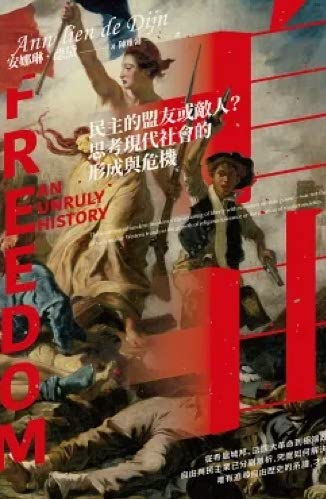Vrijheid: een woelige geschiedenis.
Alfabet Uitgevers
Vaak beschouwen we vrijheid als iets wat beschermd dient te worden, bijvoorbeeld door grenzen te stellen aan onze overheden. Maar wie bedacht deze definitie en hoe is ze ontstaan? Annelien de Dijn neemt ons mee door 2500 jaar denken over vrijheid. We bezoeken de oude Grieken en horen hoe zij denken over de inrichting van een democratische staat. We ontmoeten Plato en Socrates, Cicero en Cato, Dante, Spinoza en Hugo de Groot – en talloze andere denkers. In deze meesterlijke tocht door de geschiedenis stelt De Dijn dat we onze hedendaagse visie op vrijheid niet te danken hebben aan de vrijheidsliefhebbers van het tijdperk van de revolutie, maar aan de vijanden van de democratie. Annelien de Dijn schreef een ambitieuze en brutale geschiedenis van wat ons misschien wel het meest dierbaar is: onze vrijheid.
Besprekingen
NRC: Beste boeken van 2020.
De Tijd: Beste nonfictie boeken van 2020
“Wat is vrijheid? De opvattingen daarover lopen in de geschiedenis nogal uiteen. Prikkelend en erudiet bespreekt historica Annelien de Dijn 25 eeuwen vrijheidsbegrip in een paar honderd bladzijden. Freedom is een prestatie van formaat – en reuze-actueel.”
—Martin Sommer, De Volkskrant, viersterrenrecensie.
“Het boek swingt dankzij De Dijns oog voor details, het gruwelijke en kleinmenselijke, en dankzij haar ironische pen.”
—Sofie Vanlommel, De Tijd.
“Wanneer ben je vrij? Als de staat je met rust laat? Of ook al als je een onafhankelijke geest hebt? Het antwoord op dit soort vragen is door de eeuwen heen steeds veranderd, met als keerpunt de Franse Revolutie. Zo blijkt uit het erudiete boek van Annelien de Dijn.”
—Rob Hartmans, Historisch Nieuwsblad.

Rethinking Liberty Before Liberalism, edited with Hannah Dawson (Cambridge University Press, 2022)
Cambridge University Press (2022)
Opens up new histories of freedom and republicanism by building on Quentin Skinner’s ground-breaking Liberty before Liberalism nearly twenty five years after its initial publication. Leading historians and philosophers reveal the neo-Roman conception of liberty that Skinner unearthed as a normative and historical hermeneutic tool of enormous, ongoing power. The volume thinks with neo-Romanism to offer reinterpretations of individual thinkers, such as Montaigne, Grotius and Locke. It probes the role of neo-Roman liberty within hierarchies and structures beyond that of citizen and state – namely, gender, slavery, and democracy. Finally, it reassesses the relationships between neo-Romanism and other languages in the history of political thought: liberalism, conservatism, socialism, and the human rights tradition. The volume concludes with a major reappraisal by Skinner himself.
Reviews
“The stellar new collection surveys recent scholarship and demonstrates republicanism’s enduring power. Democratic socialists looking for inspiration about how to think about freedom beyond liberalism will doubtless find much value in the collection.”
—Jacobin (2023)

French Political Thought from Montesquieu to Tocqueville: Liberty in a Levelled Society?
Cambridge University Press (2008)
This study makes a major contribution to our understanding of one of the most important and enduring strands of modern political thought. Annelien de Dijn argues that Montesquieu’s aristocratic liberalism – his conviction that the preservation of freedom in a monarchy required the existence of an aristocratic ‘corps intermédiaire’ – had a continued impact on post-revolutionary France. Revisionist historians from Furet to Rosanvallon have emphasised the impact of revolutionary republicanism on post-revolutionary France, with its monist conception of politics and its focus on popular sovereignty. Dr de Dijn, however, highlights the persistence of a pluralist liberalism that was rooted in the Old Regime, and which saw democracy and equality as inherent threats to liberty. She thus provides an alternative context in which to read the work of Alexis de Tocqueville, who is revealed as the heir not just of Restoration liberals, but also of the Royalists and their hero, Montesquieu.
Reviews
“Annelien de Dijn’s outstanding book… elegantly reconstructs a tradition of “aristocratic liberalism” that can be traced back to Montesquieu, and which influenced a range of royalist and liberal thinkers alike in France from 1814 to 1875.”
—Political Theory (2010)
“[This book] is an invaluable study which has greatly contributed to deepening our knowledge of a rich liberal tradition.”
—English Historical Review (2010)
“Annelien de Dijn has written a very stimulating and timely book. Everyone who has embarked on the difficult journey to the roots of European liberalism and its dilemmas will find in French Political Thought from Montesquieu to Tocqueville a very useful road map.”
—Perspectives on Political Science (2009)
“French Political Thought from Montesquieu to Tocqueville is an excellent, original and erudite account of a long-forgotten chapter in modern intellectual history that will prove immensely valuable to scholars and students alike.”
—French History, 2008.


